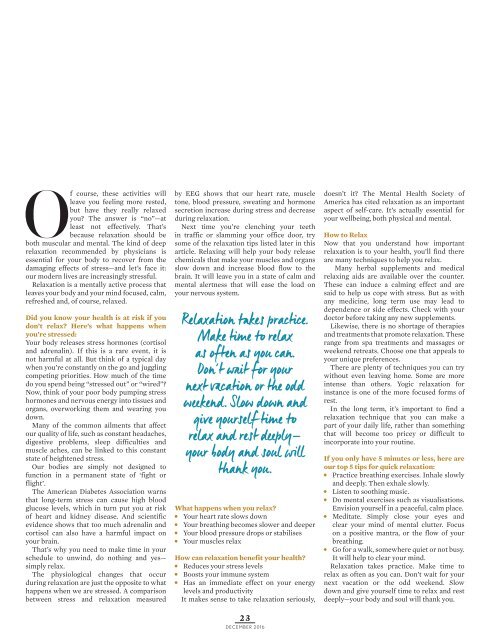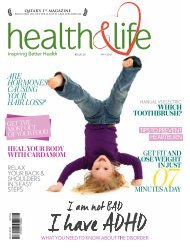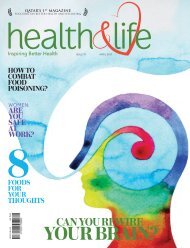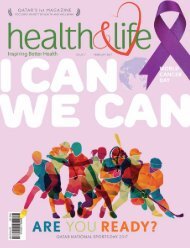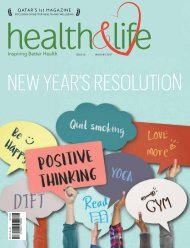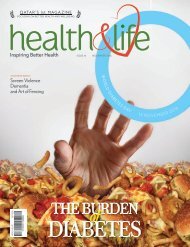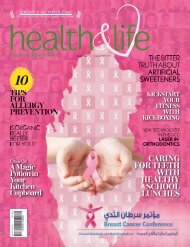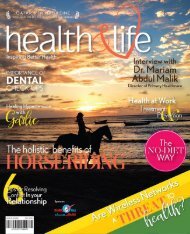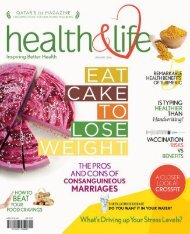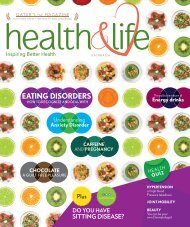December 2016 Health & Life Magazine
December 2016 Health & Life Magazine
December 2016 Health & Life Magazine
You also want an ePaper? Increase the reach of your titles
YUMPU automatically turns print PDFs into web optimized ePapers that Google loves.
Of course, these activities will<br />
leave you feeling more rested,<br />
but have they really relaxed<br />
you? The answer is “no”—at<br />
least not effectively. That’s<br />
because relaxation should be<br />
both muscular and mental. The kind of deep<br />
relaxation recommended by physicians is<br />
essential for your body to recover from the<br />
damaging effects of stress—and let’s face it:<br />
our modern lives are increasingly stressful.<br />
Relaxation is a mentally active process that<br />
leaves your body and your mind focused, calm,<br />
refreshed and, of course, relaxed.<br />
Did you know your health is at risk if you<br />
don’t relax? Here’s what happens when<br />
you’re stressed:<br />
Your body releases stress hormones (cortisol<br />
and adrenalin). If this is a rare event, it is<br />
not harmful at all. But think of a typical day<br />
when you’re constantly on the go and juggling<br />
competing priorities. How much of the time<br />
do you spend being “stressed out” or “wired”?<br />
Now, think of your poor body pumping stress<br />
hormones and nervous energy into tissues and<br />
organs, overworking them and wearing you<br />
down.<br />
Many of the common ailments that affect<br />
our quality of life, such as constant headaches,<br />
digestive problems, sleep difficulties and<br />
muscle aches, can be linked to this constant<br />
state of heightened stress.<br />
Our bodies are simply not designed to<br />
function in a permanent state of ‘fight or<br />
flight’.<br />
The American Diabetes Association warns<br />
that long-term stress can cause high blood<br />
glucose levels, which in turn put you at risk<br />
of heart and kidney disease. And scientific<br />
evidence shows that too much adrenalin and<br />
cortisol can also have a harmful impact on<br />
your brain.<br />
That’s why you need to make time in your<br />
schedule to unwind, do nothing and yes—<br />
simply relax.<br />
The physiological changes that occur<br />
during relaxation are just the opposite to what<br />
happens when we are stressed. A comparison<br />
between stress and relaxation measured<br />
by EEG shows that our heart rate, muscle<br />
tone, blood pressure, sweating and hormone<br />
secretion increase during stress and decrease<br />
during relaxation.<br />
Next time you’re clenching your teeth<br />
in traffic or slamming your office door, try<br />
some of the relaxation tips listed later in this<br />
article. Relaxing will help your body release<br />
chemicals that make your muscles and organs<br />
slow down and increase blood flow to the<br />
brain. It will leave you in a state of calm and<br />
mental alertness that will ease the load on<br />
your nervous system.<br />
Relaxation takes practice.<br />
Make time to relax<br />
as often as you can.<br />
Don’t wait for your<br />
next vacation or the odd<br />
weekend. Slow down and<br />
give yourself time to<br />
relax and rest deeply—<br />
your body and soul will<br />
thank you.<br />
What happens when you relax?<br />
Your heart rate slows down<br />
Your breathing becomes slower and deeper<br />
Your blood pressure drops or stabilises<br />
Your muscles relax<br />
How can relaxation benefit your health?<br />
Reduces your stress levels<br />
Boosts your immune system<br />
Has an immediate effect on your energy<br />
levels and productivity<br />
It makes sense to take relaxation seriously,<br />
23<br />
DECEMBER <strong>2016</strong><br />
doesn’t it? The Mental <strong>Health</strong> Society of<br />
America has cited relaxation as an important<br />
aspect of self-care. It’s actually essential for<br />
your wellbeing, both physical and mental.<br />
How to Relax<br />
Now that you understand how important<br />
relaxation is to your health, you’ll find there<br />
are many techniques to help you relax.<br />
Many herbal supplements and medical<br />
relaxing aids are available over the counter.<br />
These can induce a calming effect and are<br />
said to help us cope with stress. But as with<br />
any medicine, long term use may lead to<br />
dependence or side effects. Check with your<br />
doctor before taking any new supplements.<br />
Likewise, there is no shortage of therapies<br />
and treatments that promote relaxation. These<br />
range from spa treatments and massages or<br />
weekend retreats. Choose one that appeals to<br />
your unique preferences.<br />
There are plenty of techniques you can try<br />
without even leaving home. Some are more<br />
intense than others. Yogic relaxation for<br />
instance is one of the more focused forms of<br />
rest.<br />
In the long term, it’s important to find a<br />
relaxation technique that you can make a<br />
part of your daily life, rather than something<br />
that will become too pricey or difficult to<br />
incorporate into your routine.<br />
If you only have 5 minutes or less, here are<br />
our top 5 tips for quick relaxation:<br />
Practice breathing exercises. Inhale slowly<br />
and deeply. Then exhale slowly.<br />
Listen to soothing music.<br />
Do mental exercises such as visualisations.<br />
Envision yourself in a peaceful, calm place.<br />
Meditate. Simply close your eyes and<br />
clear your mind of mental clutter. Focus<br />
on a positive mantra, or the flow of your<br />
breathing.<br />
Go for a walk, somewhere quiet or not busy.<br />
It will help to clear your mind.<br />
Relaxation takes practice. Make time to<br />
relax as often as you can. Don’t wait for your<br />
next vacation or the odd weekend. Slow<br />
down and give yourself time to relax and rest<br />
deeply—your body and soul will thank you.


